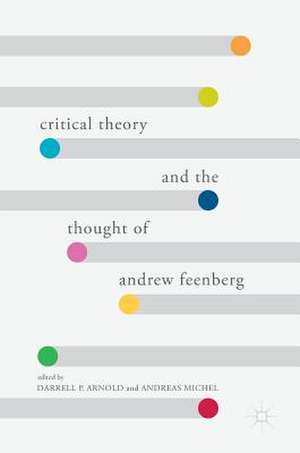Critical Theory and the Thought of Andrew Feenberg
Editat de Darrell P. Arnold, Andreas Michelen Limba Engleză Hardback – 13 noi 2017
This volume explores Andrew Feenberg’s work in critical theory. Feenberg is considered one of the key ‘second generation’ critical theorists, with a keen interest in philosophy of technology. He has made a vital contribution to critical theory in ways that remain of interest given the pressing technological issues of our time. The authors of this book highlight not only the ways that Feenberg has begun to make good on what is often characterized as “the broken promise of critical theory” to address issues of technology, but also the continued importance of critical theory more generally, and of Feenberg’s contributions to understanding this tradition.
| Toate formatele și edițiile | Preț | Express |
|---|---|---|
| Paperback (1) | 640.24 lei 6-8 săpt. | |
| Springer International Publishing – 23 aug 2018 | 640.24 lei 6-8 săpt. | |
| Hardback (1) | 645.60 lei 6-8 săpt. | |
| Springer International Publishing – 13 noi 2017 | 645.60 lei 6-8 săpt. |
Preț: 645.60 lei
Preț vechi: 759.54 lei
-15% Nou
Puncte Express: 968
Preț estimativ în valută:
123.54€ • 129.24$ • 102.62£
123.54€ • 129.24$ • 102.62£
Carte tipărită la comandă
Livrare economică 02-16 aprilie
Preluare comenzi: 021 569.72.76
Specificații
ISBN-13: 9783319578965
ISBN-10: 3319578960
Pagini: 376
Ilustrații: XII, 332 p.
Dimensiuni: 148 x 210 mm
Greutate: 0.56 kg
Ediția:1st ed. 2017
Editura: Springer International Publishing
Colecția Palgrave Macmillan
Locul publicării:Cham, Switzerland
ISBN-10: 3319578960
Pagini: 376
Ilustrații: XII, 332 p.
Dimensiuni: 148 x 210 mm
Greutate: 0.56 kg
Ediția:1st ed. 2017
Editura: Springer International Publishing
Colecția Palgrave Macmillan
Locul publicării:Cham, Switzerland
Cuprins
1. Introduction.- 2. What is the "Philosophy of Praxis"?.- 3. Philosophical Anthropology or Philosophy of Praxis? Axel Honneth and Andrew Feenberg on Lukács’s “Theory of Reification”.- 4. Gegenständlichkeit – From Marx to Lukács and Back Again.- 5. Feenberg, Rationality and Isolation.- 6. Transforming Dystopia with Democracy: The Technical Code and the Critical Theory of Technology.- 7. Andrew Feenberg’s Ecological Modernism.- 8. Between Instrumentalism and Determinism: Feenberg’s Critical Theory of Technology and Class Struggle.- 9. The Question Concerning a Vital Technology: Heideggerian Influences on the Philosophy of Andrew Feenberg.- 10. Future Questions: Democratic Technology, and the New Converging Technologies.- 11. Revisiting Critical Theory in the 21st Century.- 12. Andrew Feenberg, Critical Theory and the Critique of Technology.- 13. A Critical Response – Andrew Feenberg.- ^4. Appendix: Interview with Andrew Feenberg – Interviewed by Bruna Della Torre de Carvalho Lima and Eduardo Altheman Camargo Santos.
Recenzii
“The author does a commendable job of bridging the gap between academic discussion and grassroot practices. … Transphobic Hate Crime succeeds in being a lucid read that lays the groundwork for placing violence against the transgender community on par with ethnicity, caste and religion-based hate crime, both legally and socially.” (Ankita Gandhi, Jindal Global Law Review, Vol. 11 (1), 2020)
Notă biografică
Darrell P. Arnold is Professor of Philosophy and Program Director of Liberal Studies and Philosophy at St. Thomas University in Miami Gardens, FL, and President of the Humanities and Technology Association.
Andreas Michel is Professor of German at Rose-Hulman Institute of Technology, USA.
Andreas Michel is Professor of German at Rose-Hulman Institute of Technology, USA.
Textul de pe ultima copertă
This volume explores Andrew Feenberg’s work in critical theory. Feenberg is considered one of the key ‘second generation’ critical theorists, with a keen interest in philosophy of technology. He has made a vital contribution to critical theory in ways that remain of interest given the pressing technological issues of our time. The authors of this book highlight not only the ways that Feenberg has begun to make good on what is often characterized as “the broken promise of critical theory” to address issues of technology, but also the continued importance of critical theory more generally, and of Feenberg’s contributions to understanding this tradition.
Caracteristici
Provides an overview of numerous important discussions in critical theory, with a focus on Feenberg’s Marcusean development of critical theory. Provides a balanced treatment Feenberg’s critical theory of technology and his more general contribution to critical theory. Discusses the importance to science and technology studies, the philosophy of nature, and social theory more generally. Includes supplementary material: sn.pub/extras Includes supplementary material: sn.pub/extras
